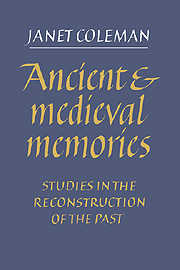Book contents
- Frontmatter
- Contents
- Preface
- List of abbreviations
- PART I THE CRITICAL TEXTS OF ANTIQUITY
- Introduction
- PART II THE PRACTICE OF MEMORY DURING THE PERIOD OF TRANSITION FROM CLASSICAL ANTIQUITY TO THE CHRISTIAN MONASTIC CENTURIES
- Introduction
- PART III THE BEGINNINGS OF THE SCHOLASTIC UNDERSTANDING OF MEMORY
- Introduction
- PART IV ARISTOTLE NEO-PLATONISED: THE REVIVAL OF ARISTOTLE AND THE DEVELOPMENT OF SCHOLASTIC THEORIES OF MEMORY
- Introduction
- 15 Arabic and Jewish translations of sources from antiquity: their use by Latin Christians
- 16 John Blund, David of Dinant, the De potentiis animae et obiectis
- 17 John of La Rochelle
- 18 Averroes
- 19 Albert the Great
- 20 Thomas Aquinas
- PART V LATER MEDIEVAL THEORIES OF MEMORY: THE VIA ANTIQUA AND THE VIA MODERNA.
- Introduction
- Conclusion: an all too brief account of modern theories of mind and remembering
- Bibliography
- Index
16 - John Blund, David of Dinant, the De potentiis animae et obiectis
Published online by Cambridge University Press: 06 January 2010
- Frontmatter
- Contents
- Preface
- List of abbreviations
- PART I THE CRITICAL TEXTS OF ANTIQUITY
- Introduction
- PART II THE PRACTICE OF MEMORY DURING THE PERIOD OF TRANSITION FROM CLASSICAL ANTIQUITY TO THE CHRISTIAN MONASTIC CENTURIES
- Introduction
- PART III THE BEGINNINGS OF THE SCHOLASTIC UNDERSTANDING OF MEMORY
- Introduction
- PART IV ARISTOTLE NEO-PLATONISED: THE REVIVAL OF ARISTOTLE AND THE DEVELOPMENT OF SCHOLASTIC THEORIES OF MEMORY
- Introduction
- 15 Arabic and Jewish translations of sources from antiquity: their use by Latin Christians
- 16 John Blund, David of Dinant, the De potentiis animae et obiectis
- 17 John of La Rochelle
- 18 Averroes
- 19 Albert the Great
- 20 Thomas Aquinas
- PART V LATER MEDIEVAL THEORIES OF MEMORY: THE VIA ANTIQUA AND THE VIA MODERNA.
- Introduction
- Conclusion: an all too brief account of modern theories of mind and remembering
- Bibliography
- Index
Summary
Once the De Anima and the De Memoria et Reminiscentia were available in Latin translations, Aristotle's theory of intellect had to be assimilated by a Christian neo-Platonic philosophical and theological tradition. Aided by Avicenna's neo-Platonic interpretation of Aristotle, Latin Christian scholars were then prepared to attempt a synthesis. Gundisalvi was able to describe the human soul as a spiritual substance, the mover of the body and its perfection or form. To this Platonist residue was added the Avicennan notion of the intellect: the human soul was said to contain only a potential intellect whereas the agent intellect was described as an angel (dator formarum). The function of the potential intellect was to attend to phantasms or images and this attention prepared it to receive enlightenment from the (separate?) agent intellect whose role was to illuminate the phantasms and create abstract concepts within the potential intellect. In line with Avicenna then, Gundisalvi endowed man with the potential intellect as the highest part of the soul which was joined to the body as its form. The soul then looks upwards to contemplate God above her. Without the Agent Intellect we have no understanding of the truth of a thing. Reason in men's minds (= God, the Agent Intellect) was a treasury of concepts whose function was to transmit intelligible forms into the receptive individual's potential intellect.
- Type
- Chapter
- Information
- Ancient and Medieval MemoriesStudies in the Reconstruction of the Past, pp. 363 - 388Publisher: Cambridge University PressPrint publication year: 1992



